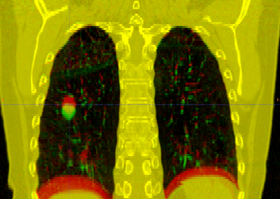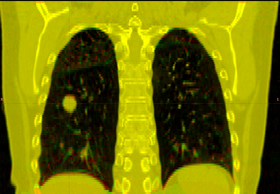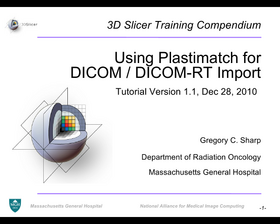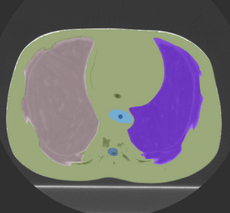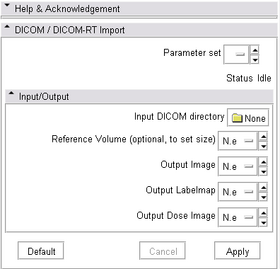Home < Documentation < 4.1 < Modules < PlmDICOMRTImport
Introduction and Acknowledgements
|
Extension: Plastimatch
Acknowledgments:
- An Ira J Spiro translational research grant (2009)
- NIH / NCI 6-PO1 CA 21239
- The Federal share of program income earned by MGH on C06CA059267
- Progetto Rocca Foundation – A collaboration between MIT and Politecnico di Milano
- The National Alliance for Medical Image Computing (NAMIC), funded by the National Institutes of Health through the NIH Roadmap for Medical Research, Grant 2-U54-EB005149; information on the National Centers for Biomedical Computing can be obtained from http://nihroadmap.nih.gov/bioinformatics
- NSF ERC Innovation Award EEC-0946463
Webpage: www.plastimatch.org
Author: Greg Sharp (Department of Radiation Oncology, Massachusetts General Hospital)
Contributor1: Julien Finet (Kitware)
Contact: Greg Sharp, <email>gcsharp@partners.org</email>
|
| National Alliance for Medical Image Computing (NA-MIC)
|
|
|
Module Description
This is the DICOM / DICOM-RT import module. It allows you to select a directory containing DICOM-RT structure sets and/or dose, which it will convert into 3D Slicer labelmap and/or scalar image. This module also loads the DICOM CT image without requiring the need to use the Slicer volume import wizard.
Note: In a Slicer, a labelmap voxel can only belong to one structure. However, DICOM-RT allows a region to belong to any number of strucutres. Therefore, importing DICOM-RT structure sets as Slicer labelmaps will usually result in a loss of data. This module uses a "last structure wins" strategy for assigning labels to overlapping volumes.
Note: Because DICOM-RT structures are specified as polylines, there is a small loss of fidelity when they are converted into rasterized volumes.
Use Cases
Tutorials
Panels and their use
- Input/Output panel:
- Input DICOM directory: Here you choose any file in the directory which contains the DICOM-RT data.
- Reference Volume (to set size): This is an optional field. But if your dicom directory does not contain a CT, it is required. Here you choose any loaded volume. The import module will create a labelmap at the same resolution and pixel spacing as the reference volume that you choose here.
- Output Image: Here you choose where to put the output CT image. Unless you want to replace an existing volume, you should choose "Create New Volume".
- Output Labelmap: Here you choose where to put the output DICOM-RT structure set labelmap. Unless you want to replace an existing volume, you should choose "Create New Volume".
- Output Dose Image: Here you choose where to put the output DICOM-RT dose image. Unless you want to replace an existing volume, you should choose "Create New Volume".
|
|
Similar Modules
References
More information on www.plastimatch.org
Information for Developers


